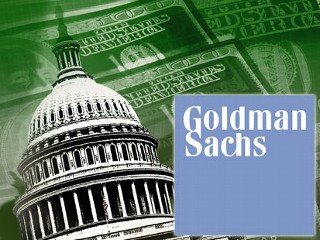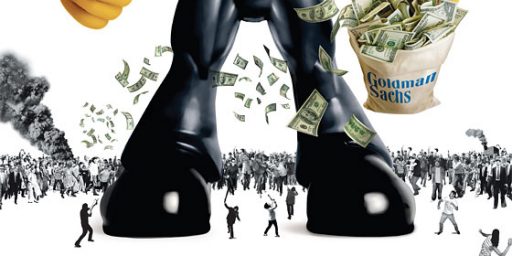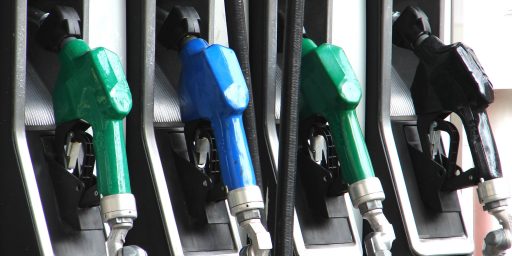James Hamilton on the Great Gasoline Conspiracy
James Hamilton does a pretty good job debunking the Great Gasoline Conspiracy about how the recent decline in gasoline prices is due to a clever Rovian plot.
An Econbrowser reader calling himself “Alan Greenspend” calls our attention to a post by Russ Winter detailing how George Bush might be responsible for falling gasoline prices.
After long shying away from oil, natural gas, metals and other raw materials, investors of all stripes — hedge funds, pension plans, endowments and individual investors — have become enamored with commodity investing. These investors, including short-term speculators, have become key in various markets, sometimes driving prices more than industrial customers who buy the materials to make things or sell services….
For evidence of these investors’ influence, consider the Goldman Sachs commodity index, one of the most popular vehicles for betting on raw materials. In July, Goldman Sachs tweaked the index’s content by cutting its exposure to gasoline. Investors tracking the index had to adjust their portfolios accordingly — which sent gasoline futures prices tumbling.—source ($$)
Undernews spells out what this means for those slow on the uptake:
Here we have Goldman, qua keeper of the commodities index, manipulating markets simply by adjusting index components…. It lends credence to the theory that the current well-publicized commodities decline is just a well-timed, well-orchestrated head fake to benefit the incumbents in the run up to the midterm elections – someone noted recently that Bush’s ratings vary inversely with gas prices.
But although Prof. Hamilton finds the story amusing it isn’t without its problems,
However, there are just a few holes in this theory through which some might try to pick a few nits:
- Between July 12 (when Winter says Goldman Sachs announced the change) and August 7, gasoline futures prices did not fall, but instead rose by 3%.
- When gasoline futures prices finally did begin to fall, the magnitude of the decline (25%) is far greater than could be attributed to temporary liquidity imbalances.
- The most important factor in the drop of gasoline prices has been the drop in the price of crude oil, in which gasoline futures would play no role.
- Price effects that result from a flood of sell orders on a market that cannot absorb them are by their nature inherently short-lived, ultimately reversed by the fundamentals of supply and demand. An effect operating through this mechanism in July could not conceivably determine the price of gasoline in November.
Some what related, commenter Anderson points to an article in the L.A. Times where Woodward claims that Bush thanked Saudi Prince Bandar for flooding the market with oil to bring down the prices in 2004 just in time for the election. One wee problem with this, according to the Energy Information Administration data don’t seem to show much of a drop leading up to the November elections in 2004. The price for all grades all formulations declined from a price of $2.104 in May to a low of $1.889 in September 13th, but then the price started to climb again reaching a price of $2.076 in the first week of November.
Maybe the ever clever Rove got the EIA and had them doctor the data or something.






One wee problem with this, according to the Energy Information Administration data don’t seem to show much of a drop leading up to the November elections in 2004.
Well, given the choice between (1) the alleged Saudi conspiracy and (2) Bush’s being out of touch with the facts, I know which one seems more plausible to *me* …
(The weird thing is, why would Bandar tell Woodward that? If he did at all, & it’s not further-removed hearsay.)
Does anyone, off hand, remember George Soros telling us that he was going to use his investments to manipulate prices for energy, with the specific purpose of making the president look bad?
Soros, wrong again.
Steve,
While I give little quarter to this Conspiracy notion and I agree with much of your analysis, there is one thing about what is going on that fuels this thinking.
Traditionally, gas prices respond almost immediately to upward fluctuations in crude prices, by the same token they have always seemed to respond much slower to downward ticks in crude prices. The reasons for this phenomenon that I have heard have been all over the map and none of them really seemed to explain it better then oil companies getting theirs while the getting was good (which I don’t have a problem with per se). The fact remains that what is unusual here is that the decline in gas prices seem to have decreased faster then the decrease in the price of crude. I don’t have access to that charts that make that comparison but if you do I have a few questions that perhaps you could answer.
Is it true that % decreases in gas prices have fallen more then % decreases in crude and if so has there ever been a time in the last 25 years when % decreases in gas prices were bigger then % decreases in crude? If this is all true what market forces would explain why it is happening now.
People believing in this conspiracy could put their money where their mouth is, and be millionaires by Christmas. If one were certain of post election rise in gasoline prices, one could, for a few thousand dollars, tie up futures contracts now, and cash in after the election. Sounds like something Mr. Soros would do.